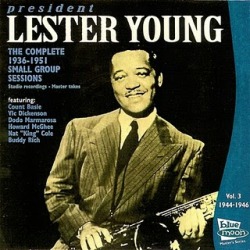Lester Young - The Complete 1936-1951 Small Group Sessions Vol.3 (2005)
Lester Young - The Complete 1936-1951 Small Group Sessions Vol.3 (2005)

01 - Blue Lester 02 - Ghost of a Chance 03 - Indiana 04 - Jump lester Jump 05 - D. B. Blues 06 - Lester Blows Again 07 - These Foolish Things 08 - Jumpin' at Messner's play 09 - It's Only a Paper Moon 10 - After You've Gone 11 - Lover Come Back to Me play 12 - Jammin' With Lester 13 - Back to the Land 14 - I Cover the Waterfront 15 - Somebody Loves me 16 - I've Found a New Baby 17 - The Man I Love 18 - Peg O' My Heart 19 - I Want to Be Happy 20 - Mean to Me Musicians: Lester Young Featuring: Count Basie, Vic Dickenson, Dodo Marmarosa, Howard McGhee, Nat King Cole, Buddy Rich
We’re reaching what arguably is the core of Lester’s production by the time of the Aladdin Recordings. “The Complete Aladdin Sessions” is a 2 CD Blue Note set, which is included here, but in chronological order i.e. mixed with other sessions of no lesser value. It encompass years 1942 to 1947 and includes such musicians as Shorty Mc Connell and Howard McGhee (tpt); Vic Dickenson (tb); Willie Smith (as); Maxwell Davies (ts); Joe Albany, Jimmy Bunn, Nat “King” Cole, Gene DiNovi, Wesley Jones, Dodo Marmarosa, Argonne Thornton (p); Irving Ashby, Nasir Baraakat, Dave Barbour, Fred Lacey, Chuck Wayne (g); Ted Briscoe, Red Callender, Curtis Counce, Rodney Richardson, Junior Rudd, Curley Russell (b); Chico Hamilton, Roy Haynes, Tiny Kahn, Lyndell Marshall, Johnny Otis, Henry Tucker (d)
Young quickly became a major soloist, using a delivery that was the precise opposite of the dominant Coleman Hawkins style… where Hawkins was bluff, aggressive and sensual, Young developed a sound that was dry, precise and almost delicate. Some of its curiosities of tone are traceable to the example of Jimmy Dorsey, a greatly under-rated saxophonist who had created a vocabulary of alternate fingerings and low, almost unpitched breath-sounds through the horn. The only other predecessor to influence Young was Bix’s sidekick, Frank Trumbauer, though less for his sound (Trumbauer favoured a C-melody saxophone) than for his distinctive habit of building up solos out of brief thematic and melodic units which he subjected to seamless variation and augmentation, of great formal control which, coupled with his unmistakable sound, represent the single most important advance in saxophone improvisation until the advent of Charlie Parker. Unlike Hawkins, Young was little concerned with playing on harmonic changes. Penguin Guide. And pay attention to track no. 19 - I want to be happy, a turning point in piano jazz playing (Nat King Cole), a magnificent interplay between all the musicians.
download (mp3 @320 kbs):
uploaded yandex 4shared mega solidfiles cloudmailru filecloudio oboom
Last Updated (Friday, 16 January 2015 17:18)








